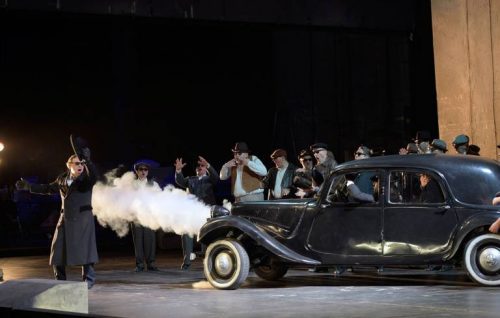 Germany Mascagni, Cavalleria rusticana and Leoncavallo, Pagliacci: Deutsche Oper Chorus and Orchestra / Paolo Arrivabeni (conductor). Deutsche Oper Berlin, 20.9.2019. (JMI)
Germany Mascagni, Cavalleria rusticana and Leoncavallo, Pagliacci: Deutsche Oper Chorus and Orchestra / Paolo Arrivabeni (conductor). Deutsche Oper Berlin, 20.9.2019. (JMI)

Production:
Director – Sir David Pountney
Sets and Costumes – Robert Innes Hopkins
Casts:
Cavalleria Rusticana
Santuzza – Elena Zhidkova
Turiddu – Roberto Alagna
Alfio – Rodrigo Esteves
Mamma Lucia – Ronnita Miller
Lola – Anna Buslidze
Pagiacci
Canio – Roberto Alagna
Nedda – Aleksandra Kurzak
Tonio and Prologue – Carlos Álvarez
Silvio – Samuel Dale Johnson
Beppe – Ya-Chung Huang
The 2019-2020 opera season is underway and, as always, Berlin’s programs are compelling. In the final ten days of September, there is enough at both the Deutsche Oper and the Staatsoper to justify a trip to the German capital. The Staatsoper features a Ring cycle conducted by Daniel Barenboim, while the Deutsche Oper offers operas with stellar casts, although there have been some significant last-minute cancellations.
My stay in Berlin began with the traditional double bill of Cavalleria rusticana and Pagliacci. The David Pountney production premiered here in April 2005, but this was my first chance to see it; his staging is traditional and narrates the plots well. Conductor Paolo Arrivabeni, musical director of the Liege Opera, gave a proper reading of the two scores, with dramatic charge and sufficient strength. He drew fine performances from both the Deutsche Oper Orchestra and the Chorus.
The setting for the two operas has been moved to 1950-1960, and Cavalleria rusticana opens on a stage holding a tall bridge beneath which the village is located. There is a modest wine shop and a path to the church lies on the right; the Easter procession takes place on the bridge and below it.
Eva-Maria Westbroek had been announced to sing the role of Santuzza, and she sang the first performance but then cancelled. She was replaced by mezzo-soprano Elena Zhidkova, who was convincing in every aspect, both singing and acting, and left nothing to be desired.
The main interest was the presence of Roberto Alagna, and his performance as Turiddu was truly faultless. He was in excellent voice, one that is now very appropriate to this character, and he lived the part intensely. The highlight of his interpretation was the famous toast, ‘Viva il vino spummeggiante’.
The part of Alfio was covered nicely by baritone Rodrigo Esteves, though it was surprising that Carlos Álvarez, who sang the role of Tonio in Pagliacci, didn’t play this part. Ronnita Miller made a convincing Mamma Lucia, while Anna Buslidze was a correct, although somewhat modest, Lola.
When the curtain opens for Pagliacci, one is at the end of Cavalleria rusticana, with the familiar ‘Hanno ammazzato compare Turiddu’ heard again. In this prelude, the stage and the scenic elements begin to move, which is spectacular. The action in Pagliacci continues from that of Cavalleria rusticana, with the Canio troupe arriving in town in a Citroën from some sixty years ago. There is no change of costumes for the staging of the comedy of Harlequin, Colombina and Pagliaccio. Pagliacci ends with the feigned death of Nedda who, at the last notes of the opera, gets up and leaves the stage with the rest of the company, while the one who is lying on the ground and supposedly stabbed is Silvio – presented here as a kind of beggar.
Roberto Alagna as Canio was superb, although I preferred his performance in Cavalleria rusticana. He offered a remarkable interpretation of the famous aria ‘Vesti la giubba’. His wife in real life was the interpreter of Nedda – soprano Aleksandra Kurzak – and she gave an admirable performance.
Vocally, the best of the opera was Carlos Álvarez in the part of Tonio, who sang a magnificent Prologue. His voice is exceptional, and he was very comfortable in the character.
Baritone Samuel Dale Johnson did well in the role of Silvio, as did tenor Ya-Chung Huang as Beppe.
José M. Irurzun
